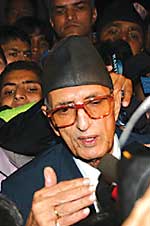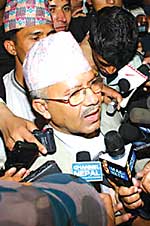 From halfway across the world, Nepal's situation looks grim- whoever becomes the next prime minister. The intentions of all the three key political players, the opposition politicians, the Maoists and the king, are driven by power. None of them seems to be bothered that the state is crumbling before their eyes.
From halfway across the world, Nepal's situation looks grim- whoever becomes the next prime minister. The intentions of all the three key political players, the opposition politicians, the Maoists and the king, are driven by power. None of them seems to be bothered that the state is crumbling before their eyes. If the leaders of the five agitating parties cannot have a united voice even during such trying times, what can we expect from them in future? It is unlikely that they will rule in harmony even if one of them were to become the prime minister. Handing them power will just intensify their squabbling. Their working unity, even when needed the most, has already turned out to be a farce. If they can't agree to choose a consensus candidate for prime ministership, can they work effectively in an all-party government and bring the Maoists back to the negotiating table?
From the Maoists' perspective, there is no reason to engage in anything that will help the current regime since what they want is its collapse. They can just sit back and watch it self-destruct.
They exercise authority over the countryside, and what they want now is to paralyse the government machinery in the district headquarters and Kathmandu Valley. They are achieving this not through rational power and persuasion, but through brutal coercion. If a mayor like Keshab Sthapit, known for his bravado, has to resign because of Maoist threats, it is unlikely anyone else can resist them.
 The king's haughtiness, on the other hand, has added fuel to the fire. He wants things under his control, but may be losing his grip. Whatever will be his future course of action, he must have realised by now that Nepal cannot be ruled by authoritarian means. The leaders have compelled him to give a collective audience, the youth on the streets are chanting ever more virulent republican slogans, the referendum in colleges are overwhelmingly for ending the monarchy-these are writings on the wall. The only question is, will King Gyanendra now acknowledge that his way is not working and restore power to people's representatives, or will he go down fighting?
The king's haughtiness, on the other hand, has added fuel to the fire. He wants things under his control, but may be losing his grip. Whatever will be his future course of action, he must have realised by now that Nepal cannot be ruled by authoritarian means. The leaders have compelled him to give a collective audience, the youth on the streets are chanting ever more virulent republican slogans, the referendum in colleges are overwhelmingly for ending the monarchy-these are writings on the wall. The only question is, will King Gyanendra now acknowledge that his way is not working and restore power to people's representatives, or will he go down fighting? Political activists on the streets and a small number of civil society members have played a vital role in stopping Nepal from sliding back into authoritarianism. Had they not consistently struggled for democracy on the streets, Nepal would have probably been under a totalitarian yoke of the left or right by now. But how long can the activists keep up the struggle?
Every conscious Nepali must now exert pressure on the political forces that are struggling in their name to compel them to find a resolution, or else our woes will multiply. People's power is the greatest power. But, sadly, Nepal's silent masses are not speaking up when they need to be heard the most.



